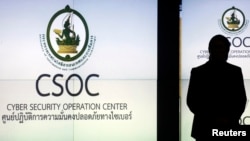Thailand has amended its laws governing computer crime in a move that media activists are denouncing as a setback for Thailand’s reputation as a regional leader for free speech.
The amendments to the 2007 Computer Crimes Act were passed overwhelmingly by the military backed National Legislative Assembly last week.
Thai officials say the changes target the digital economy and society while protecting the people’s rights from being violated on social and digital media.
The amendments also impose hefty fines and jail sentences in cases related to national security, defamation and online fraud, with jail terms of up to five years.
Two committees are also to be set up to “oversee online content,” with content providers required to keep records for two years.
But the legislation immediately sparked protests and cyber-attacks on government websites.
The protests included a nearly 400,000 signature campaign to press the government to step back from the amendments. Reports say several Thai government websites were hit by cyber-attacks Tuesday.
The amendments are in addition to Thailand's tough Lese Majeste laws protecting the Thai Royal Family from criticism and defamation, with several people facing lengthy jail sentences for alleged breaches of the law.
Analysts say the new laws may also impact political debate ahead of national elections due late 2017.
Amnesty International said the changes allow for the prosecution and imprisonment of computer users who “peacefully express their opinions online, as well as internet service providers hosting sites where such opinions are posted.”
The rights group said the laws enable authorities to “conduct invasive surveillance of internet traffic – in some cases without prior judicial authorization – and to suppress electronic content deemed to threaten a variety of vaguely defined state interests”.
Amnesty International’s Thailand director, Piyanuch Kosot, said the laws created a climate of fear and anxiety in the online community.
“Fear, fear because it impacts their privacy, it impacts the freedom to share or express or post anything on the internet. So it would be fear and then anger and then worry – that would be three key words for now,” Piyanuch told VOA.
She said her group would continue to monitor enforcement of the law as well as raising concerns, given the public’s reaction to the legislation.
Thailand’s online news and social media community have been critics since the original legislation was introduced in 2007, also under a military controlled legislative assembly.
Arthit Suyriyawongkul, from the Thai Netizen Network, said concerns date back to the original laws, and add to existing controls on online media. Arthit said there are concerns over the law’s application ahead of the 2017 vote, potentially limiting public debate.
“The problem that has been an issue in the past nine years is of course the freedom of expression. In particular we worry about the next election – because in the new section 14 – subsection 1 – there’s a term added – it’s called distorted information – this term has been added,” Arthit said.
The government targeted activists ahead of last August’s national referendum on a new constitution, leading to the arrest of several students accused of “disseminating publications” critical of the draft charter.
In an editorial, The Bangkok Post newspaper said the bill betrayed “its purpose of ensuring cyber security, freedom and privacy for people,” including the government.
The bill, the paper said, affords “too much power” to state authorities to decide what constitutes a violation under the law.
These concerns are also shared by Panitan Wattanayagorn, a political scientist and adviser to Deputy Prime Minister Prawit Wongsuwan.
Panitan said while Thailand’s ongoing deep political divide called for regulations on public and media debate, there was a concern of authorities overreaching their powers.
“In a true sense when you put too much power in the hands of a government officer and they don’t exercise good judgement there’s always a problem. That’s one area that people [who] drafted the law must listen carefully,” Panitan said.
“And mindful alone might not be enough. Civil society and others can also act as a check and balance with this [law],” he said.
But Panitan also said he believed the regulations were necessary given the issues of false news, slander and defamation on social media postings.
Critics say the “criminalization of speech and computer data, intermediary liability – burden of proof, the unpredictability of the law, expanded investigation powers, broader control of information and surveillance of encrypted information are reasons for concern.
But government supporters say “all content,” especially on social media, would be “better filtered”, while libelous content would be more strictly defined to reduce legal cases of libel.







